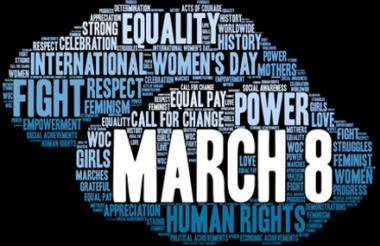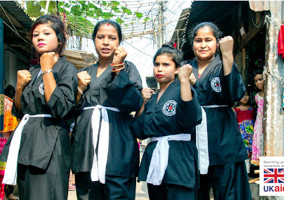When I was growing up, my dad told me I could be anything I wanted to be. I believed him. And it was with this support behind me that I ventured into the world of work.
What I hadn’t counted on though were the many men - and some women - who put barriers in my way purely because of my gender. Such as the male managing director, who had apparently hired me for my expertise, but then when I presented my strategy, told me “what do you know? You’re just a girl”. Or the men present at the parliamentary roundtable event I was chairing who assumed that when I walked through the door, I was there to serve them coffee. Or the jobs I didn’t get because I was a woman of child-bearing age. As such, I have often found myself having to work much harder than my male counterparts. This is both frustrating and tiring.
Sadly, my story is not unique. I look around at my strong, intelligent female friends, and I see that they are also tired. We are tired of having to prove that we can do the job just as well as men. We are tired of having to fight for a seat at the table. We are tired of having to be superwomen who can juggle high-powered careers, home school our kids, keep house, look amazing and still have enough energy at the end of the day to be good in bed.
Yes, there has been progress. Thanks to the campaigning efforts of charities, NGOs and activists, we have won hard-fought-for rights over our bodies. We have more women than ever in leadership roles. We have Kamala Harris, the first ever woman, and woman of colour, to be appointed vice president of the United States. But it is 2021 and she is still the first.
Despite the suffragettes, the #metoo movement and all these many decades of campaigning and lobbying and protest, we are still achieving “firsts”. The patriarchy still exists. This does not feel like success to me.
Only 7% of FTSE 100 chief executives are women. In global politics, only 24 per cent of all national parliamentarians are women. In our own sector, just 27.5% of women hold the top three jobs of chair, CEO and CFO. These are statistics we hear often but that never seem to change, despite the plethora of “awareness-raising campaigns” our sector and others undertake.
At the current rate, it will take more than 80 years before women achieve equality at chief executive level. I don’t have that long to wait. Do you?
Change the narrative
So, how do we speed things up?
Here, I look for inspiration from the formidable but sadly no longer with us, supreme court justice, Ruth Bader Ginsburg. She once said: “fight for the things you care about but do it in a way that will lead others to join you”.
I believe that campaigners for gender equality need to change the narrative.
All too often, our language and our actions have been defensive, aggressive and polarising. Our anger is justified, but frequently we have used it in a way that has created more division. We only need to look at Twitter to see countless examples of this. Rather than being inclusive – the very outcome we are striving to achieve – we are being exclusive.
When I have worked with women’s groups and suggested we involve men in the conversation, I’ve been over-ruled on the basis that these are women’s issues and women’s issues alone. While debating women’s rights as part of the masters I am currently studying, my fellow students argue that men have had their turn and now it’s women’s time to speak.
International Women’s Day is another example. How many of you have organised or attended events aimed at raising awareness of gender discrimination or which celebrate women’s achievement? How many of those events were attended by men?
I’ve been to a hundred different events focused on women’s leadership and every time I’ve been able to count on one hand the number of men in attendance. We are preaching to the converted. We women already know we’re highly skilled, capable individuals. It’s men who we need to convince and how can we do that if they’re not in the room with us?
Similarly, we know that some men champion women because “these days” they have to. They get it’s the right thing to do, but they don’t necessarily understand why. They don’t appreciate how debilitating period pain or the menopause can be, or how terrifying it can be to walk home alone in the dark. How can we help them understand this if we don’t create spaces where they feel welcome and able to contribute to the conversation without being shot down?
This does women a disservice as well as men. Without more men as our allies, we cannot achieve our goal of gender equality.
History backs me up here.
Take votes for women – this has almost always been presented as a protest by women for women, but there were many men committed to suffrage too. In the UK, for example, George Lansbury MP resigned his seat over the issue. While in the US, congressman Thetus W Sims showed his dedication to the cause by showing up to a debate about suffrage with an unset broken arm and shoulder - so determined he was to persuade his less-convinced counterparts to vote in women’s favour .
We have more women in board rooms – because men hired them.
We have maternity and paternity rights, equal pay, sexual harassment laws because men have understood why they are important and so voted for them.
Increased rights for women does not mean fewer rights for men
I urge campaigners to change the narrative around gender equality to more clearly demonstrate that this is not a zero-sum game.
We could do much more to reiterate that increased rights for women does not mean fewer rights for men. Or we could emphasise that the more successful, sustainable economies that gender equality will create mean improved financial security for men as well as women.
We could focus on how greater sharing of domestic labour and caring responsibilities means more fulfilling lives and relationships for everyone, including happier marriages .
Likewise, feminist activists have spent a lot of time and energy pointing out the very worst excesses of men’s behaviour. This is warranted and necessary. But we also need to highlight the best behaviours. And encourage more of it.
We need more male role models who can show other men that emotional intelligence is a strength not a weakness, and more men taking on traditional “women’s roles” and shouting about the many benefits and rewards these positions offer them.
Importantly, we need more men challenging other men over unhelpful, inappropriate or harmful language, conduct and decision-making.
However, we cannot expect to be successful in this unless we change the narrative and do more to welcome them into the conversation.
If we are to achieve gender equality, the next phase of feminism absolutely relies on us extending our movement to men. Women can’t do this on their own. Why would we want to? Let’s share the workload with men and dismantle the patriarchy together.
Becky Slack is managing director of Slack Communications and a frustrated gender equality campaigner. She's currently studying a Masters in Political Strategy and Communications at the Brussels School of International Studies with the aim of finding new and more effective ways of influencing change. She'd love to hear from other campaigners about their ideas for doing things differently.
Related articles












